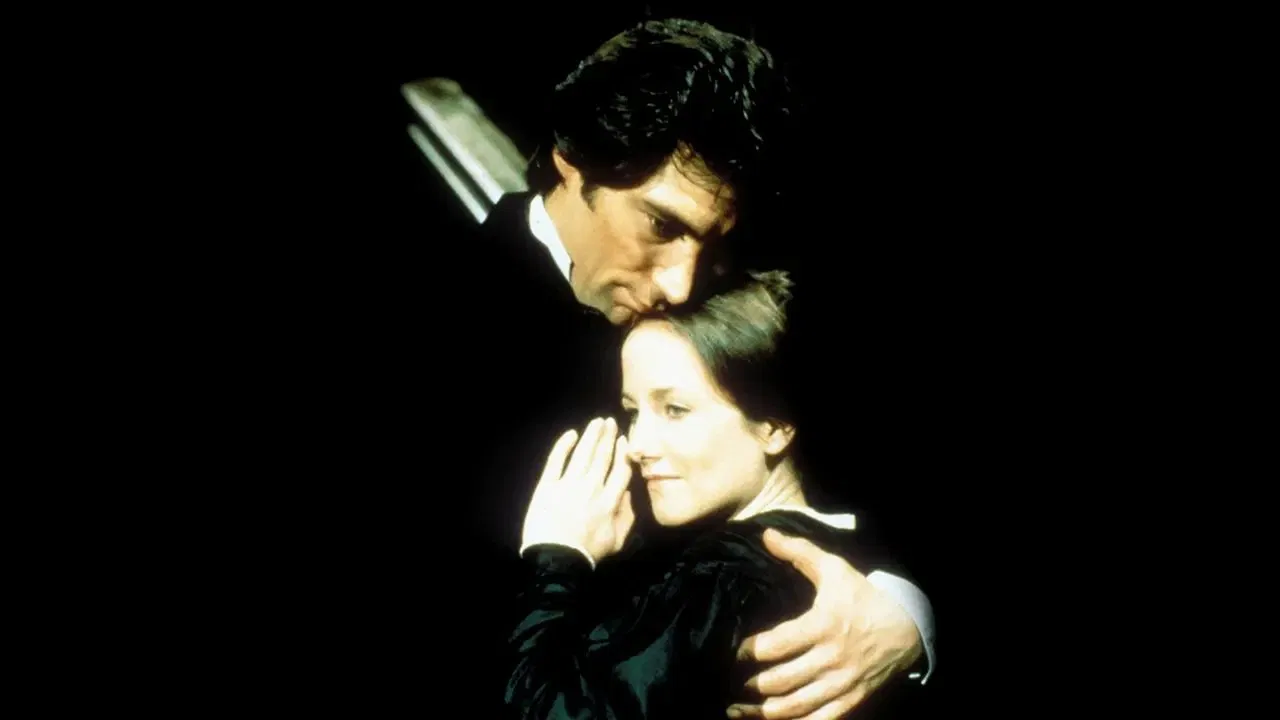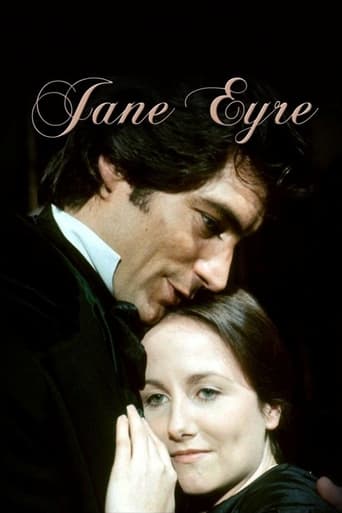

If all of the actors and actresses played their parts equally well, I would have given this a 10! The passionate acting on the part of Sian Pattendon for Jane as a child, was superb. Timothy Dalton played the part of Mr. Rochester as well as the George C. Scott version. Yet I disagree with many of the other reviewers on Zelah Clarke's performance. While I agree she did a great job in her acting, yet her personality seemed a little too sedate and not as passionate as I picture Jane Eyre. I've seen this story in 3 different versions, and this version was the best one I've seen! I wish they had cast an actress with a more passionate personality, and it would have been perfect.
... View MoreLOVES-Bessie. In most adaptations, Bessie is depicted as a nice person. Here, as in the book, Bessie wasn't always nice to Jane. She scolded her for no good reason just as everyone else did. However, she was the only one that showed any kindness to Jane at all.-The girls. Georgiana and Eliza were not cut! I wish they showed what happened to them, but I'm just glad they weren't cut.-Mr. John, Mr. Briggs, and John Eyre. These are secondary characters. I completely understand why they are usually cut, but it's nice to see the reference.-St. John Rivers. I loved Bicknell's depiction of St. John Rivers! He is perfectly cold and single minded as I imagined him to be.-Main characters. I thought Clarke's Jane was superior to Fontaine's. I could sense her reserved passion, and she burst at the right spots. I thought Orson Welles was the best Mr. R depicted on film, but Dalton's delivery still convinced me. He captured his internal conflict spot on. Dalton and Clarke had great chemistry.-The Gypsy. I'm so glad they kept that in!-Script. They kept most of my favorite lines from the book.The BAD-Helen Burns. Cut to grave stone? Really!? Also, her Christian beliefs were not completely depicted. This was an important point in shaping Jane's character, and it was skimmed over.-The hair. Oh the hair. I can't believe they gave Mr. R a mullet! St. John Rivers had the 70's flowing hair! This was the single, most reprehensible thing done to the book, which is why I only gave 9 stars.-Ending. I wish they showed what happened to the other characters. St. John, Mrs. Fairfax, Diana and Mary, etc.
... View MoreDirector: Julian Amyes Stars: Zelah Clarke, Timothy DaltonJane Eyre is a great love story of a couple who meet and soon feel an attraction for each other. However this attraction evokes conflict in each. This conflict is resolved by suppressing (concealing)their love for one another. Jane's suppression is passive, but Rochester's initial suppression is to treat Jane somewhat coldly, as a master to his servant, then warming to her later but in a reserved manner. Intrigued by Jane, Rochester intelligently probes her to reveal her personality but she responds in intellectual kind while maintaining her station as subordinate (but sometimes mildly impudent) manner.However, subtle indications are shown in their growing relationship where mutual love is hinted - Jane shows jealousy of Rochester's female friend and devoted service to his wishes, while Rochester shows his captivation with Jane's independent and intelligent opinions, her devotion to her moral principles, and her lack of greed and selfishness. Rochester is not put off by Jane's plain appearance, and Jane does not find Rochester particularly attractive, even though he is - both are of like mind in judging beauty by personality rather than by physical attributes. They still conceal their growing love from one another.Their love grows, but remains concealed, again because each is in conflict over loving the other. Jane is in conflict because she realizes she is just a "plain Jane" and a mere servant (although born into a good family) who is below the social status of Rochester who would be a prize catch for any lady of high social standing. Rochester is in conflict, not because of Jane's servant status, which is irrelevant to him, but because of his concealed secret that he must never reveal. So each falls deeper in love while fighting hard to mask any display of their love for one another.Simmering conflicts eventually boil over in seeking resolution. This occurs as the turning point in their relationship.The climatic end is the movie's resolution.Some versions handle some of the above key elements better than other versions, but most are lacking to some degree in portraying most of these elements. This 1983 version handles all the above key elements quite well, in a comprehensive and psychologically valid manner. As a result one is afforded the opportunity to understand the complicated dynamics of the love relationship that Bronte so well delineated in her book. Clarke's Jane is perhaps a little too suppressed - stoic and Victorian, but this in keeping with the self-disciplined and rational Jane that she superbly presents throughout the film. Dalton's Rochester is brilliantly performed throughout the film - perhaps his best performance. He is presented as intelligent, emotionally expressive, physically large and powerful with a forceful personality, altogether dashing. Dalton's Rochester is in stark contrast to Clarke's Jane, of diminutive appearance with a passive and controlled personality. However. this is in keeping with the theme of Jane's lower status relative to Rochester, and her belief that she would be unworthy of his love (causing her to mask her love for Rochester).Dalton and Clarke excel in portraying all the key elements essential to making he story work as a great love story. Dalton/Clarke are an excellent Rochester/Jane (I have seen the 1943 version and all versions from 1973 to the present).Additionally this a very coherent and complete version of Jane Eyre, along with the superb 1973 version. All key events are shown in a form that is completely developed - no summary presentation here. No version is totally faithful to the book - all versions either modify or omit events depicted in the book. This is only a problem where the essence of the book is degraded. It is no problem in this Dalton/Clarke version (and with the 1973 version as well). I have seen all film versions since 1973 as well as the 1943 version. I was beginning to think that although all are very good, all were lacking in many respects. Then I saw this 1983 version with Timothy Dalton, and then the 1973 version with Jayston (my favorite), which are superior overall, to all the rest.Please see my reviews of five other versions of Jane Eyre.
... View MoreI think this is a great version, I came on here before, to help me find which version I should use and I went to Jane Eyre 1983 and read a comment from users comment and then helped me to get this version. I do not regret picking this version and neither will you. I tried watching all the other versions and none matched up to it,There is nothing like the book,and TRUST ME if you are reading the book you want something that is going to match up with it. When you are looking for something real and moving after you have read the book it is hard because you want something that is going to match up with that. I would say God personally led me to this version. It points to true love for a humans. I would say God's love is greater.if there is anything better, I would like to see it. but so far there is none like it!
... View More